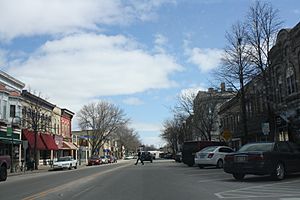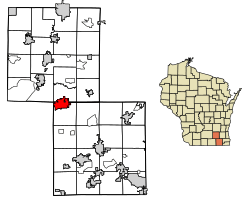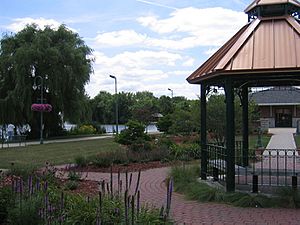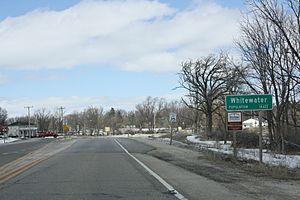Whitewater, Wisconsin facts for kids
Quick facts for kids
Whitewater, Wisconsin
|
|
|---|---|

Main Street, downtown Whitewater
|
|

Location of Whitewater in Walworth County and Jefferson County, Wisconsin
|
|
| Country | United States |
| State | Wisconsin |
| Counties | Walworth, Jefferson |
| Government | |
| • Type | Common Council |
| Area | |
| • Total | 9.14 sq mi (23.67 km2) |
| • Land | 8.84 sq mi (22.89 km2) |
| • Water | 0.30 sq mi (0.77 km2) |
| Elevation | 824 ft (251 m) |
| Population
(2020)
|
|
| • Total | 14,889 |
| • Density | 1,684.95/sq mi (650.58/km2) |
| Time zone | UTC-6 (Central (CST)) |
| • Summer (DST) | UTC-5 (CDT) |
| Zip Code |
53190
|
| Area code(s) | 262 |
| FIPS code | 55-86925 |
| GNIS feature ID | 1576690 |
Whitewater is a city in Wisconsin, USA. It is found in parts of Walworth and Jefferson counties. The city is close to the southern part of the Kettle Moraine State Forest. Whitewater is also home to the University of Wisconsin–Whitewater. In 2020, about 14,889 people lived there.
Contents
Discovering Whitewater's Past
Whitewater was first built where Whitewater Creek and Spring Brook meet. It got its name from the white sand found in these streams. A gristmill, which grinds grain, was built on Whitewater Creek. The pond created by this mill is now called Cravath Lake.
The city grew quickly when Wisconsin's first railroad line came through in 1853. However, it faced challenges when its two biggest employers left town.
Early Settlers from New England
Whitewater was first settled by people from New England. These settlers were often called "Yankees." They were descendants of English Puritans who settled New England in the 1600s. In the early 1800s, many New England farmers moved west. They went into what was then the wild Northwest Territory.
Many arrived after the Erie Canal was finished. When they reached what is now Whitewater, it was mostly thick forests and wild prairies. These New Englanders created farms, built roads, and set up government buildings. They also started mail routes.
Values and Beliefs of the First Settlers
The settlers brought their New England values with them. These included strong support for ending slavery, known as abolitionism. They also cared a lot about education. They built many schools in the area. Most of them belonged to the Congregationalist Church. Some were Episcopalian. Because of a religious movement called the Second Great Awakening, some had become Methodists before moving to Whitewater. For a long time, Whitewater's culture was very similar to early New England culture.
Diversity in Whitewater's History
Unlike many other parts of Wisconsin, Walworth County did not have many German-American settlers. Whitewater had almost no German-Americans. This was at a time when many German immigrants were coming to Wisconsin. Whitewater and Walworth County were also strongly against slavery. The abolitionist movement was very popular among the New England families there.
Later in the 1800s, immigrant families came to Whitewater from other countries. Many came from Belgium, Canada, Russia, and Serbia. Smaller groups also arrived from France and England.
Whitewater's Location and Environment
The United States Census Bureau says that Whitewater covers about 9.06 square miles (23.47 square kilometers). Most of this area is land, about 8.76 square miles (22.69 square kilometers). The rest, about 0.30 square miles (0.78 square kilometers), is water. Most of the city is located in Walworth County.
Whitewater's Climate
Whitewater has a climate with warm summers and cold winters. Here's a look at the typical weather:
| Climate data for Whitewater Wastewater Treatment Plant, Wisconsin (1991–2020 normals, extremes 1949–present) | |||||||||||||
|---|---|---|---|---|---|---|---|---|---|---|---|---|---|
| Month | Jan | Feb | Mar | Apr | May | Jun | Jul | Aug | Sep | Oct | Nov | Dec | Year |
| Record high °F (°C) | 60 (16) |
71 (22) |
83 (28) |
90 (32) |
95 (35) |
100 (38) |
102 (39) |
101 (38) |
100 (38) |
89 (32) |
78 (26) |
66 (19) |
102 (39) |
| Mean maximum °F (°C) | 48.3 (9.1) |
51.5 (10.8) |
67.1 (19.5) |
78.3 (25.7) |
85.9 (29.9) |
90.8 (32.7) |
91.4 (33.0) |
90.3 (32.4) |
88.1 (31.2) |
80.8 (27.1) |
66.2 (19.0) |
51.9 (11.1) |
93.7 (34.3) |
| Mean daily maximum °F (°C) | 27.4 (−2.6) |
31.3 (−0.4) |
43.4 (6.3) |
56.5 (13.6) |
68.6 (20.3) |
78.4 (25.8) |
81.9 (27.7) |
80.2 (26.8) |
73.6 (23.1) |
60.6 (15.9) |
45.6 (7.6) |
33.0 (0.6) |
56.7 (13.7) |
| Daily mean °F (°C) | 19.5 (−6.9) |
23.0 (−5.0) |
34.1 (1.2) |
45.9 (7.7) |
57.6 (14.2) |
67.7 (19.8) |
71.4 (21.9) |
69.4 (20.8) |
62.0 (16.7) |
50.1 (10.1) |
37.2 (2.9) |
25.6 (−3.6) |
47.0 (8.3) |
| Mean daily minimum °F (°C) | 11.5 (−11.4) |
14.7 (−9.6) |
24.9 (−3.9) |
35.4 (1.9) |
46.7 (8.2) |
57.0 (13.9) |
60.9 (16.1) |
58.6 (14.8) |
50.5 (10.3) |
39.5 (4.2) |
28.7 (−1.8) |
18.2 (−7.7) |
37.2 (2.9) |
| Mean minimum °F (°C) | −10.7 (−23.7) |
−5.9 (−21.1) |
4.3 (−15.4) |
21.2 (−6.0) |
31.3 (−0.4) |
41.3 (5.2) |
47.7 (8.7) |
46.2 (7.9) |
35.5 (1.9) |
25.1 (−3.8) |
12.2 (−11.0) |
−2.8 (−19.3) |
−14.6 (−25.9) |
| Record low °F (°C) | −37 (−38) |
−27 (−33) |
−20 (−29) |
0 (−18) |
17 (−8) |
26 (−3) |
40 (4) |
31 (−1) |
26 (−3) |
13 (−11) |
−10 (−23) |
−25 (−32) |
−37 (−38) |
| Average precipitation inches (mm) | 1.58 (40) |
1.53 (39) |
1.88 (48) |
3.52 (89) |
4.19 (106) |
4.96 (126) |
3.76 (96) |
4.31 (109) |
3.52 (89) |
3.01 (76) |
2.22 (56) |
1.75 (44) |
36.23 (920) |
| Average snowfall inches (cm) | 8.5 (22) |
9.9 (25) |
4.4 (11) |
0.7 (1.8) |
0.1 (0.25) |
0.0 (0.0) |
0.0 (0.0) |
0.0 (0.0) |
0.0 (0.0) |
0.1 (0.25) |
1.2 (3.0) |
9.0 (23) |
33.9 (86) |
| Average precipitation days (≥ 0.01 in) | 9.5 | 8.5 | 9.4 | 12.3 | 13.6 | 12.4 | 10.4 | 10.8 | 10.5 | 12.0 | 9.4 | 9.6 | 128.4 |
| Average snowy days (≥ 0.1 in) | 5.1 | 4.1 | 2.2 | 0.5 | 0.0 | 0.0 | 0.0 | 0.0 | 0.0 | 0.1 | 0.9 | 4.1 | 17.0 |
| Source: NOAA | |||||||||||||
People of Whitewater
Recently, Whitewater has welcomed many new residents. About 800 to 1000 immigrants have moved to the city. Most of these new residents are from Nicaragua. In 2024, the city's police chief and city manager asked the government for more help. They needed resources to support the growing population.
Population in 2020
In 2020, the city had 14,889 people living there. There were 4,767 households and 1,806 families. The population density was about 1,685 people per square mile (651 per square kilometer).
The people living in Whitewater were mostly White (78.8%). Other groups included African American (4.2%), Asian (2.5%), and Native American (0.5%). About 7.2% were from other races, and 6.4% were from two or more races.
In the households, 19.9% had children under 18. Also, 25.5% had people aged 60 or older. About 9.9% had someone living alone who was 65 or older. The average household had 2.32 people. The average family had 3.01 people.
The average age in the city was 21.6 years old. Many residents were young: 10.6% were under 18, and 57.3% were between 18 and 24. Overall, 71.5% were between 15 and 44 years old. The city had slightly more males (50.9%) than females (49.1%).
| Historical population | |||
|---|---|---|---|
| Census | Pop. | %± | |
| 1860 | 2,731 | — | |
| 1880 | 3,617 | — | |
| 1890 | 4,359 | 20.5% | |
| 1900 | 3,405 | −21.9% | |
| 1910 | 3,224 | −5.3% | |
| 1920 | 3,215 | −0.3% | |
| 1930 | 3,465 | 7.8% | |
| 1940 | 3,689 | 6.5% | |
| 1950 | 5,101 | 38.3% | |
| 1960 | 6,380 | 25.1% | |
| 1970 | 12,038 | 88.7% | |
| 1980 | 11,520 | −4.3% | |
| 1990 | 12,636 | 9.7% | |
| 2000 | 13,437 | 6.3% | |
| 2010 | 14,390 | 7.1% | |
| 2020 | 14,889 | 3.5% | |
| U.S. Decennial Census | |||
Population in 2010
In 2010, Whitewater had 14,390 people. There were 4,766 households and 1,781 families. The city's population density was about 1,643 people per square mile (634 per square kilometer). There were 5,113 homes, with an average of 584 homes per square mile (225 per square kilometer).
The racial makeup of the city was mostly White (88.0%). Other groups included African American (3.5%), Asian (1.9%), and Native American (0.3%). About 4.5% were from other races, and 1.8% were from two or more races. People of Hispanic or Latino background made up 9.5% of the population.
In the households, 18.8% had children under 18. About 26.2% were married couples. Also, 7.4% had a female head of household with no husband. About 3.8% had a male head of household with no wife. Most households (62.6%) were not families. About 34.6% of all households were single individuals. And 9.7% had someone living alone who was 65 or older. The average household had 2.28 people. The average family had 3.01 people.
The average age in the city was 21.9 years. About 11.9% of residents were under 18. A large group, 53.5%, were between 18 and 24. About 14.7% were 25 to 44, and 11.8% were 45 to 64. People 65 or older made up 8.4% of the population. The city had slightly more males (50.7%) than females (49.3%).
Arts and Fun in Whitewater
Whitewater hosts many fun events each year. "Freeze Fest" happens in January. There's also a Bridal Fair and a Farm Toy Show in February. In July, you can enjoy Maxwell Street Day and the 4th of July celebration.
During the summer, the Minneiska Water Ski Shows perform on Whitewater Lake. If you like biking, group tours leave several times a week from the Highway 12 crossing of the Ice Age Trail. From September to April, the Young Auditorium at the university offers different kinds of entertainment.
Parks and Outdoor Activities
Whitewater has five community parks for everyone to enjoy. These include Cravath Lakefront Park, Moraine View Park, Starin Park, Trippe Lake Park, and Whitewater Creek Nature Area. There's also Effigy Mounds Preserve, which is an archeological park. Whitewater also has an aquatic and fitness center.
Learning in Whitewater
The Whitewater Unified School District (WWUSD) serves the city. It has five schools and one university within Whitewater:
- Lakeview Elementary School
- Lincoln Elementary School
- Washington Elementary School
- Whitewater Middle School (WMS)
- Whitewater High School (WHS)
- University of Wisconsin–Whitewater
Kettle Moraine Baptist Academy is also in the city. It teaches students from kindergarten through 12th grade.
Famous People from Whitewater
- Stephen Ambrose, author, historian
- George Awsumb, architect
- James C. Bartholf, Wisconsin politician and newspaper editor
- Zadoc P. Beach, Wisconsin politician
- Marvin H. Bovee, Wisconsin politician
- Edwin Coe, newspaper editor and politician
- Charles Coleman, Wisconsin politician
- Edward S. Curtis, photographer, director, actor, cinematographer
- Frank A. Dudley, New York state legislator and lawyer
- Jeffrey Foucault, recording artist
- Eva Kinney Griffith, journalist, temperance activist
- Ben Heller, Major League baseball player
- George W. Hull, Wisconsin politician
- Jeff Jagodzinski, NFL assistant coach, former head coach of the Boston College Eagles
- Dale Markham, NFL player
- Benjamin McCready, painter
- Stephen Nass, Wisconsin politician
- Eddie O'Donnell, Indy car driver
- Leon Pescheret, fine artist, designer, printmaker
- Elaine Roe, U.S. Army officer, one of the first four women to be awarded the Silver Star
- Edward J. Roethe, Wisconsin legislator
- Henry Edgar Roethe, Wisconsin legislator
- Byron Storm, Wisconsin legislator
- Eric Studesville, NFL assistant coach
- Eleazer Wakeley, Justice of the Nebraska Territory Supreme Court
- Jerome Anthony Watrous (1840–1922), author, newspaper writer, Republican politician, and lt. colonel
- Thompson Weeks, Wisconsin politician
- Samuel A. White, Wisconsin politician
See also
 In Spanish: Whitewater (Wisconsin) para niños
In Spanish: Whitewater (Wisconsin) para niños
 | William Lucy |
 | Charles Hayes |
 | Cleveland Robinson |



